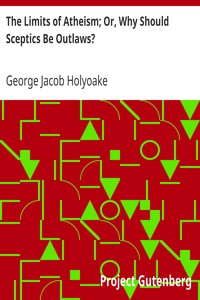The Limits of Atheism; Or, Why Should Sceptics Be Outlaws? by George Jacob Holyoake
"The Limits of Atheism; Or, Why Should Sceptics Be Outlaws?" by George Jacob Holyoake is a philosophical treatise written in the late 19th century. This book explores the moral and civil rights of atheists and skeptics, advocating for their legal recognition and equality in society. Holyoake emphasizes a nuanced understanding of atheism, differentiating between mere negation of belief and a more affirmative stance he terms "Cosmism," which affirms the wonder and self-sufficiency
of nature without necessarily denying the possibility of a higher power. In this work, Holyoake argues that atheists should not be perceived as outlaws or inferior citizens due to their beliefs. He critiques the negative connotations associated with atheism and promotes a more positive form of skepticism that values reason and reflection. By dissecting the contemporary perception of atheism, he challenges the notion that skeptical individuals must be considered morally low or socially deviant. Holyoake discusses the need for civil rights for non-believers, asserting that dismissing their perspectives contributes to a broader societal oppression. He aims to cultivate a respectful dialogue around atheism and its implications for moral philosophy and personal integrity, positioning it as a legitimate avenue for understanding the universe. (This is an automatically generated summary.)
Read or download for free
| How to read | Url | Size | |||
|---|---|---|---|---|---|
| Read now! | https://www.gutenberg.org/ebooks/36798.html.images | 71 kB | |||
| EPUB3 (E-readers incl. Send-to-Kindle) | https://www.gutenberg.org/ebooks/36798.epub3.images | 129 kB | |||
| EPUB (older E-readers) | https://www.gutenberg.org/ebooks/36798.epub.images | 127 kB | |||
| EPUB (no images, older E-readers) | https://www.gutenberg.org/ebooks/36798.epub.noimages | 85 kB | |||
| Kindle | https://www.gutenberg.org/ebooks/36798.kf8.images | 306 kB | |||
| older Kindles | https://www.gutenberg.org/ebooks/36798.kindle.images | 298 kB | |||
| Plain Text UTF-8 | https://www.gutenberg.org/ebooks/36798.txt.utf-8 | 61 kB | |||
| Download HTML (zip) | https://www.gutenberg.org/cache/epub/36798/pg36798-h.zip | 127 kB | |||
| There may be more files related to this item. | |||||
About this eBook
| Author | Holyoake, George Jacob, 1817-1906 |
|---|---|
| Title | The Limits of Atheism; Or, Why Should Sceptics Be Outlaws? |
| Credits | Produced by David Widger |
| Reading Level | Reading ease score: 58.4 (10th to 12th grade). Somewhat difficult to read. |
| Language | English |
| LoC Class | BL: Philosophy, Psychology, Religion: Religion: General, Miscellaneous and Atheism |
| Subject | Atheism |
| Category | Text |
| EBook-No. | 36798 |
| Release Date | Jul 20, 2011 |
| Most Recently Updated | Jan 29, 2013 |
| Copyright Status | Public domain in the USA. |
| Downloads | 219 downloads in the last 30 days. |
| Project Gutenberg eBooks are always free! | |

